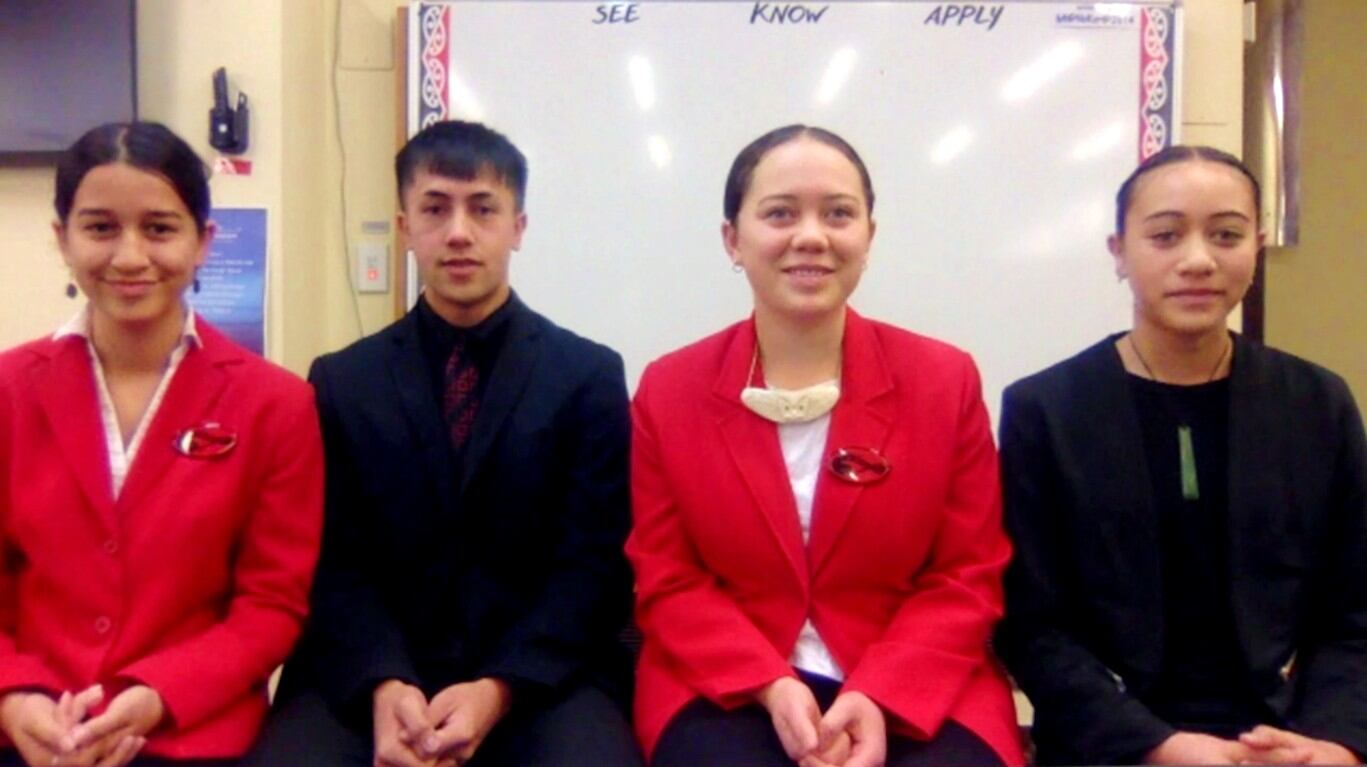The next generation of inspiring speakers is already among us.
The best young Māori orators of the Manawatū Horowhenua region took to the stage last Friday, to share their kōrero at the regional Ngā Manu Kōrero competition held at Queen Elizabeth College, Palmerston North.
A common theme among speakers was the sharing of encouraging messages for rangatahi to express themselves. Two schools, Manukura and Mana Tamariki, put their stamps on the competition, with winners in all four main categories.
Manukura
Matariki Black (17, Ngai Tūhoe, Ngāti Kahungunu)
- Korimako trophy for best senior English.
Aria Komene (13, Ngāti Kauwhata, Rangitāne, Ngāpuhi, Ngati Kahungunu, Kai Tahu)
- Sir Turi Carroll trophy for best junior English.
Mana Tamariki
Taarewa-i-te-rangi (17, Ngāruahinerangi, Ngāti Kahungunu ki Wairarapa)
- Pei Te Hurinui Jones trophy for best senior Māori.
Te Atahaia Durie (13, Ngāti Kauwhata, Rangitāne, Ngāti Porou, Te Aitanga a Hauiti)
- Rāwhiti Ihaka trophy for best junior Māori.

Te Atahaia Durie, Matariki Black, Taarewa-i-te-rangi, Aria Komene / Source: Te Ao Tapatahi
The winners were on Tapatahi this morning to talk about their experiences and the road ahead leading to the nationals in their hometown in September.
Asked how it felt to win, Matariki Black said it was quite surprising.
"My topic 'When they see us', talks about the way the media portrays Māori, and I think it's important that we have a voice in the media to express our emotions, our feelings out to the world."
“I didn’t really think I could do it but I put in a lot of hard work and the result was taking it out. And my family was proud as of me, no matter the outcome” Black said.
Junior English champ Aria Komene said, “it was really good being able to do that, and being able to know that I can stand up in front of a crowd and say my speech.”
Taarewa-i-te-rangi, who came second at last year’s regional competition, came back to finish what she started - “Ko te whāinga matua i roto i taku kōrero, he whakakipakipa i te tangata ki te whai i te ara kei te whai ahau. Ki te whai i te reo me ngā āhuatanga katoa o te ao māori, he rangona kia kitea i te ao.” – “The main goal of my speech was to encourage others to follow the path I have taken. To embrace te reo Māori and all aspects of te ao Māori, so it can be seen and heard throughout the world.”
Te Atahaia overcame her thoughts - “I rere pai te rā, i wīwī, wāwā ōku whakaaro i te roanga o te rā, heoi, mutu ana tū, i tau te wairua, katahi i rere pai te toenga o te rā” - “The day flowed well, my thoughts were scattered throughout the day, however, after my stand my spirit settled and the rest of the day was good,” she said.
The road to nationals
With the national competition being held in their hometown of Palmerston North, the four are preparing to meet with the best of the best young orators from around the motu in September.
“I’m going to work hard or equally as hard, or harder than I did preparing for regionals but also stay humble going to the nationals,” -Matariki Black said
“Ko te mea nui māku, he whai wheako hōu, akoranga hōu, āhuatanga hōu, he pai ai taku whakakī i ōku kete mō te whakataetae e whai ake nei” – “The main thing for me is to have new experiences and learn more to equip myself and fill my baskets of knowledge for the competition ahead.” - Taarewa-i-te-rangi said.
“I’ll practise day and night and put in all my hours of work.” - Aria Komene said.
